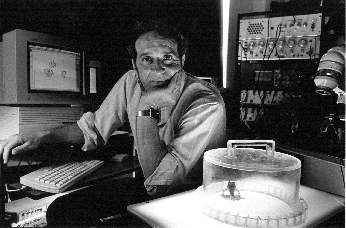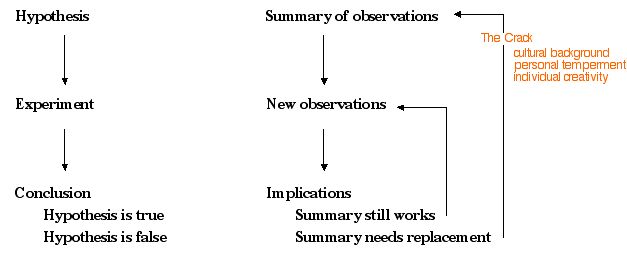Being a Scientist/Explorer/Creator (Theory)
Starting Wherever We Are, To Get it Less Wrong, Together

Getting to know each others stories
Paul Grobstein - I'm a neurobiologist who has done research on nervous system organization and development in crayfish, leeches, rabbits, and frogs. This research is related to and has extended to trying to explore more directly several broader questions about brain organization and development in humans, including the nature of representations of space, the distinction between conscious and
unconscious processing, and the nature of individual choice and free will. I'm also a parent, biologist and educator, with an array of still more general interests in the underpinnings of human
behavior, the nature of biological, cultural, and intellectual change, complex systems and general information processing principles, and the character of human understanding and the relationships among its different forms. Associated with this is a strong commitment to improving the educational environment at all levels and for all people.
Common to all these aspects of myself is a strong belief in the capabilities of the human brain to explore and create, both individually and collectively, in ways that achieve improved understandings of the human condition and open new avenues for its further development. And a belief that modern information technology, including the web, is a distinctive and valuable tool for the extension of human understanding. Having grown up with science, I have found it to be a central component of agency, a valuable source of both power and humility.
Write a brief introduction to yourself in the institute forum area. In what ways are you similar to/different from others here? Include something of your feelings about "science", whether you think of yourself as a scientist or not and why.

| | | |
| Science as body of facts established by specialized fact-generating people and process
Science as successive approximations to Truth
Science as authority about "natural world"
| Science as process of getting it less wrong, potentially usable by and contributed to by everyone
Science as ongoing story telling and story revision: repeated making of observations, interpreting and summarizing observations, making new observations, making new summaries ... individually and collectively
Science as skepticism, a style of inquiry that can be used for anything, one which everybody is equipped to to/can get better at/be further empowered by, and contribute to - a way of making sense of what is but even more of exploring what might yet be
|
| If science is as much about creation as discovery then the "crack"is a feature, not a bug ... and differences among people are an asset to the process rather than a problem or an indication it isn't working
|
Trying It Out ...
Which of the following two stories do you prefer?
- The earth is flat
- The earth is round
Because of ...
- personal observations?
- observations made by others (personally verified or not)?
- social stories (heard from others)?
- usefulness?
Relevant observations:
Is one or the other story true? Have there been others? Will there be?
Which of the following two stories do you prefer?
- The sun goes around the earth
- The earth goes around the sun
Because of ...
- personal observations?
- observations made by others (personally verified or not)?
- social stories (heard from others)?
- other?
Relevant observations:
Is one or the other story true? Have there been others? Will there be others?
Scientific stories are frequently efforts to summarize the widest possible range of observations, always motivate new observations and hence new stories, should never be understood as "authoritative" or "believed in", do not compete with or invalidate other stories.
Key issues about scientific stories
- What observations do they summarize?
- What new observations do they motivate?
|
Which of the following stories do you prefer?
- Existing life forms (including humans) are as they are because of a previous and ongoing process of evolution consisting of random change and natural selection (differential reproductive success).
- Existing life forms (including humans) are as they are because of repeated creative acts of a supernatural being with a plan and intent?
- Existing life forms (including humans) are as they are because of an initial creative act with a supernatural being with a plan and intent?
- Other?
Because of ...
- personal observations?
- observations made by others (personally verified or not)?
- social stories (heard from others)?
- other?
- is one or another story "true"?
Relevant observations:
Science is a tool to help one become better at thinking for oneself
at using observations to make one's own stories that motivate new observations that motivate new stories that one shares with others
Science education should help people become better at thinking for themselves
at ongoing, shared, exploration and creation
That's the theory, this afternoon the practice
| Science = open-ended transactional cyclic observation/interpretation/creation; being wrong and conflict an important part of it; give up "definiteness" for usefulness and openness (pass it on).
Where do we get the ability to inquire? to make observatons? tell/share/compare stories? revise hypotheses/stories? Tomorrow the brain ...
|
What do think of the science as story telling and story revising? of "getting it less wrong"? Good points? Bad points? Put your thoughts in the institute forum area to help others think about it too.
| Institute Forum
| Brain and Behavior Institute 2006
| Summer Institutes
| Serendip Home |
Send us your comments at Serendip

© by Serendip 1994-
- Last Modified:
Wednesday, 02-May-2018 10:51:15 CDT
|




